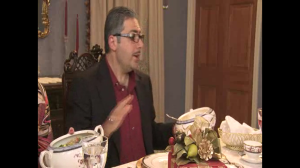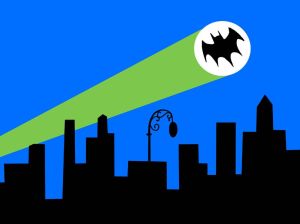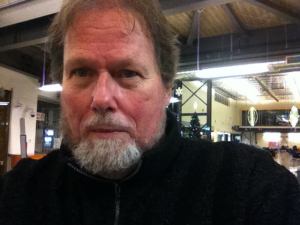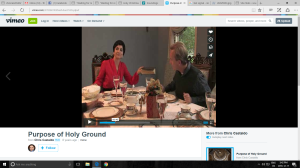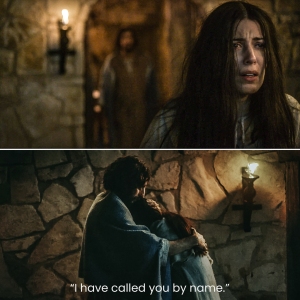
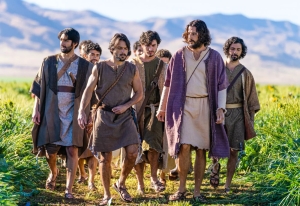 Bad scripts and worse acting are frequently heard criticisms when it comes to the Christian entertainment genre. The “big knock” against the Christian movie, television and streaming genre for more secular audiences – aside from the fact the films are Christian – has long been heavy-handed theological scripts, clunky acting and cheesy sets, with mainly bad plots, which, to be charitable, do little more than preach to the choir. There hasn’t been, aside from the occasional blockbuster, much for broader audiences to judge such films or television on if they were done, well, well. You know, decent scripts, good actors, high production values, that sort of thing. Hollywood, which is usually a synonym for Sodom or Gomorrah in the vocabulary of many Christians, is seldom on the side of the angels, unless commercial potential can stand in for faith in salvation if need be.
Bad scripts and worse acting are frequently heard criticisms when it comes to the Christian entertainment genre. The “big knock” against the Christian movie, television and streaming genre for more secular audiences – aside from the fact the films are Christian – has long been heavy-handed theological scripts, clunky acting and cheesy sets, with mainly bad plots, which, to be charitable, do little more than preach to the choir. There hasn’t been, aside from the occasional blockbuster, much for broader audiences to judge such films or television on if they were done, well, well. You know, decent scripts, good actors, high production values, that sort of thing. Hollywood, which is usually a synonym for Sodom or Gomorrah in the vocabulary of many Christians, is seldom on the side of the angels, unless commercial potential can stand in for faith in salvation if need be.
The Chosen TV series debuted on Dec. 24, 2017. Two seasons have aired. Season 3 is expected to air later this year. Seven seasons are planned.
Angel Studios, the streaming platform behind the Christian series The Chosen, announced in early January that it had raised $47 million in funding from venture capitalists. The financing was led by VC firm Gigafund and Bain-backed Uncorrelated Venture. Original seed investors Alta Ventures and Kickstart Fund also participated.
In addition to VC money, $5 million was crowdsourced directly from fans, and The Chosen is the most crowdfunded media project in history. It has received 9.6 out of 10 on IMDb. John Jurgensen, a reporter who covers music, television and digital entertainment for The Wall Street Journal, wrote last November: “The success of the series is a powerful reminder to Hollywood that faith-focused projects can sometimes become breakthrough hits.” Chris DeVille, a journalist based in Ohio, writing for The Atlantic magazine last June, observed: “Take it from a critic and a Christian with an aversion to Christian entertainment: The show is good.”
I concur. It is the first Biblical series I’ve seen that consistently portrays Jesus as both “fully human” and “fully God.” Usually, I find the former left out. But Dallas Jenkins’ Jesus (Jonathan Roumie) has a very keen sense of humour when the occasion calls for it. Who would have imagined? Jesus with a sense of humour. Indeed, these Apostles (my favourite, I think, is young Matthew [Paras Patel], the tax collector, who has Asperger’s Syndrome, a form of Autism Spectrum Disorder), Pharisees (shout out to Erick Avari as Nicodemus, a Pharisee and a member of the Sanhedrin), Sadducees, and assorted residents of the Red Quarter of Jerusalem, located near the Gate of the Moors and Coponius Gate, in the southwestern part of the Western Wall, all appear as flesh-and-blood real people might well have in the 1st century Anno Domini (AD).
For background expertise and script consulting, the creators of the show have been conferring with Father David Guffee, a priest of the Congregation of Holy Cross, based at St. Monica Catholic Church in Santa Monica, California, and national director at Family Theater Productions; Rabbi Jason Sobel of Fusion Ministries in Hollywood, and Professor Doug Huffman, associate dean and professor of New Testament, overseeing the undergraduate division of Talbot School of Theology at Biola University in La Mirada, California. Last weekend, Jeanette and I watched Dallas Jenkins, creator, director and co-writer of The Chosen, do a “deep dive” into the first season’s eight episode on the show’s free mobile app with the three Biblical consultants, Father Guffee, Rabbi Sobel, and Professor, and Jenkins kicking off the 40-minute or so deep dive roundtable discussion with the timeless, “A Catholic priest, a Jewish rabbi, and an evangelical scholar walk into ….” This sounds like the beginning of a joke with reference to a drinking establishment, but 1st century Jerusalem Anno Domini (AD) and theology is what’s on tap here.
I first got to know the work of Dallas Jenkins back in 2011 with Jeanette at the Winnipeg Real to Reel Film Festival, as he had just directed What If … the previous year.
What If, a film about a businessman who is shown by an angel what his life could have become if he had followed God’s calling for his life, starred Kevin Sorbo, Kristy Swanson, Debby Ryan, and John Ratzenberger, who portrayed mail carrier Cliff Clavin on the comedy series Cheers, for which he earned two Primetime Emmy nominations. As “Mike the Angel,” Ratzenberger throws what I consider to be the best guardian angel punch in cinematic history to date at Ben Walker (Kevin Sorbo).
Dallas Jenkins dad, Jerry B. Jenkins, did most of the actual writing of the Left Behind novels, while Tim LaHaye was primarily the idea man. Left Behind started out as a series of 16 best-selling novels, published between 1995 and 2007, dealing with the Protestant evangelical Christian predispensationalist “End Times” view of the Rapture and the Tribulation that follows. The drama comes from the struggle of the rag-tag Tribulation Force against the Global Community and its leader Nicolae Carpathia – the Antichrist.
I’ve read the 16 novels – from Left Behind: A Novel of the Earth’s Last Days, published in 1995, and then Tribulation Force: The Continuing Drama of Those Left Behind; Nicolae: The Rise of Antichrist; Soul Harvest: The World Takes Sides; Apollyon: The Destroyer Is Unleashed; Assassins: Assignment: Jerusalem, Target: Antichrist; The Indwelling: The Beast Takes Possession; The Mark: The Beast Rules the World; Desecration: Antichrist Takes the Throne; The Remnant: On the Brink of Armageddon; Armageddon: The Cosmic Battle of the Ages; Glorious Appearing: The End of Days; The Rising: Antichrist is Born: Before They Were Left Behind; The Regime: Evil Advances: Before They Were Left Behind; The Rapture: In the Twinkling of an Eye: Countdown to Earth’s Last Days, right through to Kingdom Come: The Final Victory in 2007.
Left Behind isn’t great literature,” wrote Alissa Wilkinson, critic-at-large at Christianity Today in the Washington Post in 2016, “but it’s highly engaging reading for a mass market, fast-moving fiction with elements drawn from sci-fi, romance, disaster porn, and political and spy novels. Left Behind has the code-cracking conspiracy feel of a Dan Brown novel, but also the appeal of a familiar story – one that inscribes the reader’s own world, with its televisions and airplanes and phones and computers, into biblical events.
“This is the genius of the Left Behind books: They work on two levels.”
You can also follow me on Twitter at: https://twitter.com/jwbarker22
